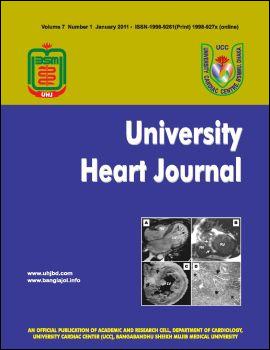Application of Total Cardiovascular Risk Estimation in The Management of A Patient with Cardiovascular Risk
DOI:
https://doi.org/10.3329/uhj.v7i1.10207Keywords:
Application, Total Cardiovascular Risk Estimation, Management, Patient, Cardiovascular RiskAbstract
Medical intervention based on the concept of total coronary risk in the asymptomatic population without cardiovascular disease (CVD) is widely advocated throughout the world.
All adults above 40 years, without history of CVD or diabetes, and who are not on treatment for blood pressure (BP) or lipids, should be considered for a comprehensive risk assessment in primary care once every five years. Our patient is an asymptomatic obese, hypertensive, dyslipidaemic individual who is also a smoker. He has a family history of premature atherosclerotic disease. His co-morbidities include mild asthma and hepatic impairment. His estimated total cardiovascular risk according to Joint British Society risk score1 for 10 year cardiovascular event is 40% which qualifies him in the high risk category.
His estimated score according to HEART score based on the SCORE project2 is 7% which refers to a 10-year risk mortality. According to HEARTSCORE, a score of more than 5 is considered to be at high risk. The following discussion aims to cut down his cardiovascular risk by having life-style changes and use of cardioprotective medication where appropriate.
DOI: http://dx.doi.org/10.3329/uhj.v7i1.10207
UHJ 2011; 7(1): 28-34
Downloads
180
198




